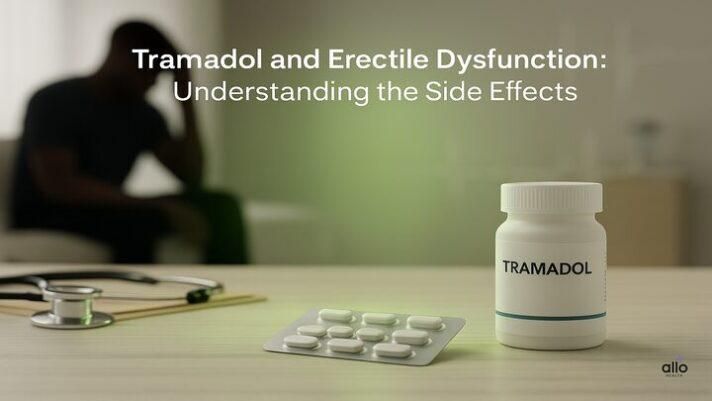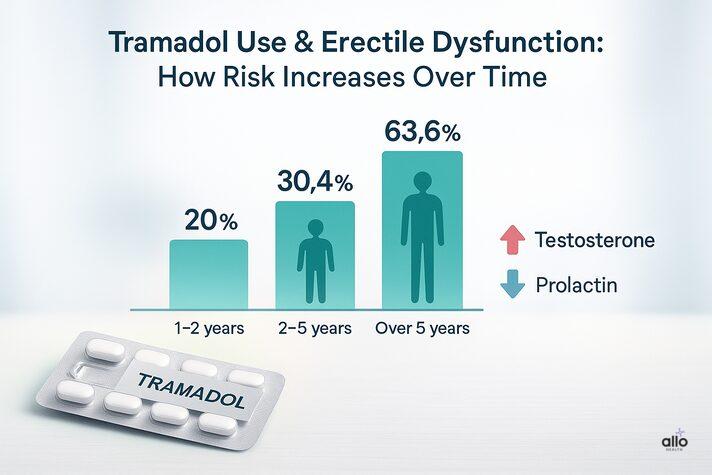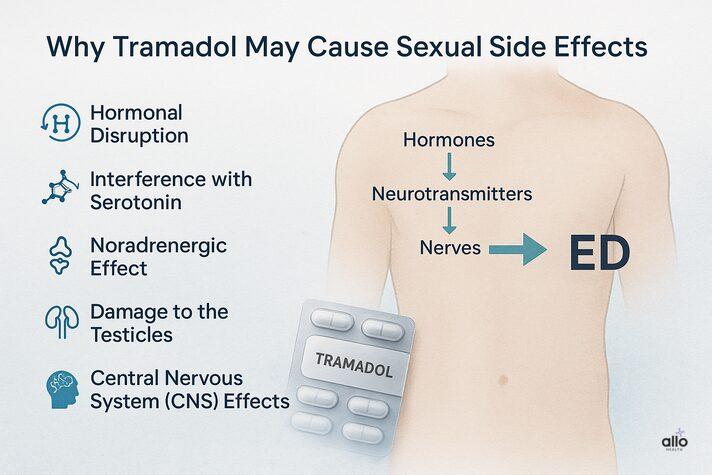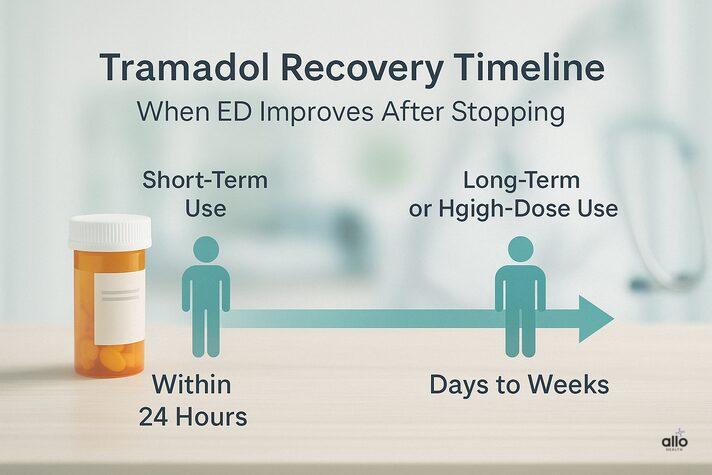Tramadol and Erectile Dysfunction: How Painkillers Impact Male Sexual Health
Written by Dr. Deepali Anand

Dr. Deepali is a medical writer and healthcare professional with a background in clinical surgery and patient care. Having transitioned from active clinical practice to medical communications, she specializes in bridging the gap between complex clinical data and patient education. Dr. Deepali is dedicated to creating evidence-based content that is grounded in scientific rigor and empathy, ensuring that sensitive topics like sexual wellness and mental health are accessible and empowering for every reader.
•
November 3, 2025
Our experts continually monitor the health and wellness space, and we update our articles when new information becomes available.

Quick Read
Tramadol can cause erectile dysfunction and lower libido, especially with long-term or high-dose use. The medication disrupts hormones (lowering testosterone and raising prolactin), interferes with serotonin and norepinephrine signaling, and can even damage testicular tissue over time. Short-term users face minimal risk (less than 1% experience ED), and the condition is usually reversible once the medication is stopped or reduced under medical supervision, most men recover within days to weeks. If you're experiencing sexual side effects, consult your doctor about adjusting your dosage, switching to safer pain alternatives like NSAIDs or physical therapy, or exploring ED treatments such as Viagra or Cialis. Always taper off Tramadol gradually with professional guidance to avoid withdrawal symptoms and support full recovery of sexual function.
Tramadol erectile dysfunction side effects are real, but they’re not something most users need to panic about. It is a popular painkiller, can cause erectile dysfunction or lower libido, mainly when used in high doses or for long periods. For short-term users, the risk is rare and usually reversible once the medication is stopped. Still, it’s important to understand why this happens and what to do if you notice changes in sexual performance.
This article explains how it affects hormones, nerve function, and erections and offers practical, doctor-backed steps to help you recover safely and confidently.
Allo asks
Have you ever noticed changes in your sexual performance while taking Tramadol?

Can Tramadol Cause Erectile Dysfunction?
Tramadol, a common pain management medication, can cause erectile dysfunction, especially when taken in high doses or for a long time.
Research[1] shows that chronic use can affect hormone levels; it may lower testosterone and raise prolactin, both of which play key roles in sexual health and erection function.
Interestingly, it is sometimes prescribed off-label to treat premature ejaculation, but it’s important to understand the full picture before considering it for sexual benefits.[2]
The severity of erectile dysfunction often depends on how much Tramadol a person takes and for how long. In one study[3]:
- 20% of men dependent on Tramadol for 1-2 years had ED.
- 30.4% had ED after 2-5 years of use.
- 63.6% had ED when dependence lasted over 5 years.
In addition, about 48% of chronic users reported a drop in libido, which often appeared alongside erectile issues, and both symptoms worsened with longer use.
The good news is that erectile dysfunction is uncommon among people taking standard therapeutic doses for short-term pain relief, affecting less than 1% of users.[3] That means Tramadol-related ED is mostly a concern for long-term or high-dose use, not typical pain treatment.
According to Allo Health, every 1 in 2 patients has ED, which is based on our internal clinical data of more than 2.5 Lakh patients who come to our clinic.
Let’s take a closer look at why this happens.

Why Tramadol May Cause Sexual Side Effects
Tramadol can affect sexual health and lead to erectile dysfunction in several ways. Here’s how it happens:
1. Hormonal Disruption
Tramadol can lower testosterone levels and increase prolactin by suppressing the hypothalamic-pituitary-gonadal (HPG) axis, the system that controls hormone balance.[4]
This hormonal imbalance is one of the main reasons men experience erectile dysfunction and low libido while using Tramadol for long periods.
2. Interference with Serotonin
Tramadol affects serotonin, often called the “feel-good” hormone, by blocking its reuptake in the brain.[5]
While serotonin helps regulate mood, too much serotonin can interfere with sexual arousal and make it harder to achieve or maintain an erection.
3. Noradrenergic Effect
Tramadol also inhibits norepinephrine (noradrenaline) reuptake. This neurotransmitter plays a role in the body’s stress response and blood flow regulation.[6]
When it disrupts these signals, it can further impact erectile function and sexual performance.
4. Damage to the Testicles
Long-term or high-dose use can damage the testicular tissue responsible for producing testosterone and sperm.[7]
Since testosterone is key to healthy erections and overall sexual desire, a drop in its production can contribute to erectile dysfunction.
5. Central Nervous System (CNS) Effects
Tramadol is an opioid-like pain reliever that acts directly on the central nervous system. This can slow down nerve signaling between the brain and body, affecting sexual stimulation and erection control.

Is Erectile Dysfunction From Tramadol Permanent?
In most cases, erectile dysfunction caused by Tramadol is temporary and reversible[3], especially when the dose is reduced or the medication is stopped under medical supervision.
Type of Use
ED Risk
What Happens
Short-Term Use
Rare
Usually resolves soon after stopping
Long-Term / High-Dose Use
Higher Risk
Hormonal imbalance (↓ sex hormones, ↑ prolactin) & possible testicular tissue effects
Recovery After Stopping Tramadol
Most people notice improvement in erection and desire within days to a few weeks after discontinuing it.
For those who have used it for extended periods or at higher doses, recovery may take longer, but it typically improves with time and medical care.
Do not stop tramadol suddenly on your own, as it can cause other problems; always talk to your doctor and take their advice.

Managing Tramadol-Related Erectile Dysfunction
If you’re experiencing erectile dysfunction while taking Tramadol, the good news is that it’s often treatable and reversible. Here are some effective steps that can help:
1. Review Your Dosage
Always talk to your doctor about your current dose. Sometimes, reducing the dosage or gradually switching to a safer option can help restore normal sexual function.
Never stop Tramadol suddenly; it should be done under medical supervision.
2. Try Safer Pain Relief Alternatives
You don’t always need opioid analgesic to manage pain. Ask your doctor about non-opioid painkillers such as:
- Acetaminophen (Paracetamol)
- Non-steroidal anti-inflammatory drugs (NSAIDs) like ibuprofen or naproxen
For healthy chronic pain, consider non-drug methods such as physiotherapy, mindfulness, yoga, or heat therapy. These can reduce dependence on medications and improve overall well-being.
3. Explore ED Treatment Options
Several medical treatments can help improve erections:
- PDE5 inhibitors like Viagra (sildenafil) or Cialis (tadalafil)
- L-arginine supplements help boost nitric oxide and blood flow.
- A healthy diet and regular exercise, which improve circulation and testosterone levels
These should be used only under a doctor’s advice, especially if you’re still taking pain medication.
4. Manage Stress & Mental Health
Chronic pain and medication-related anxiety can also affect your sex life. Stress-management techniques, such as deep breathing, meditation, or therapy, can help you feel more in control. Talking to a sex therapist or counselor can also improve confidence and sexual satisfaction.
Bottom Line
Tramadol erectile dysfunction side effects are real, but it’s mostly seen in people who use the medication for a long time or at high doses. If you’re experiencing erection problems or are planning to use Tramadol long-term, it’s important to talk to your doctor about its sexual dysfunctions. With proper guidance, most men can manage or even reverse these side effects safely.
Disclaimer
The following blog article provides general information and insights on various topics. However, it is important to note that the information presented is not intended as professional advice in any specific field or area. The content of this blog is for general educational and informational purposes only. The content should not be interpreted as endorsement, recommendation, or guarantee of any product, service, or information mentioned. Readers are solely responsible for the decisions and actions they take based on the information provided in this blog. It is essential to exercise individual judgment, critical thinking, and personal responsibility when applying or implementing any information or suggestions discussed in the blog.
Most Asked Questions
Can Tramadol cause erectile dysfunction?
Yes. Tramadol can cause erectile dysfunction and reduced libido, especially with long-term or high-dose use. This happens due to hormonal changes (lower testosterone, higher prolactin) and its effect on brain chemicals like serotonin and norepinephrine. ED from Tramadol is usually temporary and reversible once the dosage is reduced or the medicine is stopped under a doctor’s guidance.
How to cure erectile dysfunction caused by Tramadol?
Treatment depends on the cause and duration of Tramadol use. Most men recover naturally after adjusting the dose or switching to a non-opioid painkiller. For faster recovery, doctors may recommend PDE5 inhibitors (like Viagra or Cialis), L-arginine supplements, or lifestyle changes such as regular exercise, a balanced diet, and stress management. Always consult your doctor before stopping or changing any medication.
What are the side effects of Tramadol in men?
Common side effects include nausea, dizziness, constipation, drowsiness, and reduced libido. In some cases, long-term or high-dose use can cause hormonal imbalances, leading to erectile dysfunction or delayed ejaculation. These side effects are typically dose-dependent and can improve once the medication is adjusted or stopped.
Does Tramadol affect testosterone levels?
Yes. Prolonged Tramadol use can lower testosterone and increase prolactin levels by affecting the hypothalamic-pituitary-gonadal (HPG) axis — the system that regulates hormones. This imbalance may reduce sexual desire and contribute to erectile dysfunction. Testosterone levels often return to normal after discontinuing Tramadol under medical supervision.
What is the best pill for erectile dysfunction?
The most commonly prescribed ED medications are PDE5 inhibitors like sildenafil (Viagra), tadalafil (Cialis), and vardenafil (Levitra). These drugs help improve blood flow to the penis and support stronger erections. However, they should be taken only under medical advice, especially if you’re using other medications like Tramadol or have underlying health conditions.
Sources
- 1.
Gonadotoxic effect of tramadol administration: A prospective controlled study
- 2.
Tramadol Use in Premature Ejaculation: Daily Versus Sporadic Treatment
- 3.
Effect of tramadol dependence on male sexual dysfunction
- 4.
A population-level decline in serum testosterone levels in American men
- 5.
Serotonin Syndrome Induced by Combined Use of Tramadol and Escitalopram: A Case Report
- 6.
Tramadol
- 7.
Comparative histological study on the effect of tramadol abuse on the testis of juvenile and adult male albino mice


